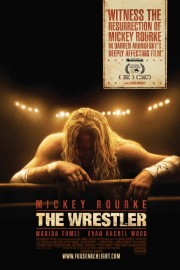The Wrestler
Perhaps it’ because of the circumstances and emotions that I’ve had to face within myself over the past year or two, perhaps it’s because I’ve always had a soft spot for the “underdog sports movie,” but something deep down in me was stirred watching Darren Aronofsky’s Oscar-nominated “The Wrestler.” While it’s- by design in Robert Siegel’s emotionally-driven script- built more on the formulas of its genre than Aronofsky’s previous films (“The Fountain,” “Requiem for a Dream,” and “Pi”), it’s also a step towards completion the filmmaker- whose previous work, however excellent, is also largely inaccessible to the mainstream- succeeds at with a deft touch. Anything is possible from this filmmaker now.
The same can be said for Mickey Rourke, who takes acting to a new level of force and feeling as Randy “The Ram” Robinson. Long past his prime, “The Ram” still works the canvas over the weekends- putting his body through very-real abuse even though he and his comrades work out their routines ahead of time (one match involving barbed wire, staple guns, and falls from a ladder is as brutal as anything Aronofsky’s put onscreen). Despite the physical toll, Randy has peace of mind in the ring, and in the locker room, where he’s greeted with open arms by his feel wrestlers.
During the week, however, life is tough. Randy is pressed for hours at the store he works at, with the manager at the trailer park he lives in forced to lock him out when he gets behind on the rent. No matter; he seems content, even if he doesn’t have a whole lot of personal connections beyond the trailer park children he plays games with or Cassidy (Oscar nominee Marisa Tomei, who matches Rourke beat-for-beat as a woman who puts her own body through Hell for her profession), a stripper at a local club he not only gives his money to, but also lets into his personal world, including telling her about the estranged daughter (Evan Rachel Wood, whose distrust of Randy is palpable, especially when he misses a dinner date) he begins to hope to connect with again. When he has a heart attack after a particularly brutal match, and has to have bypass surgery (leaving a scar on his chest worse that almost anything he’s sustained in the ring), Randy is left to consider what’s important in life, even if it means leaving the life he loves just before a rematch with his greatest opponent on the 20th Anniversary of their first match.
At its core, the thing that resonates most in Aronofsky’s film is the raw and riveting look at Randy’s blue-collar life in a way that hasn’t really been seen by another filmmaker besides Stallone in the first and last “Rocky” movies. In the midst of the worst economic climate since the Great Depression for the middle class, “The Wrestler” is given added urgency and the ability to inspire audiences as Randy follows his heart even when things are at their worst. It’s no wonder Bruce Springsteen- whose best music has always been about blue-collar struggles- was inspired, at the urging of pal Rourke, to write the unforgettable title song for this film. The stark minimalism and soul-stirring craft of his Golden Globe-winning song- stupidly passed over by the Academy- is matched by the equally minimal but effective score by long-time Aronofsky collaborator Clint Mansell, who enlisted former Guns N’ Roses guitarist Slash to play guitar on the score.
But the fact that Aronofsky found a way to include two of my long-time favorite artists on his film’s soundtrack is not the only reason his film struck a chord with me. “The Wrestler” hit all the right notes for me because, like his 2006 film “The Fountain,” it dug deep into my soul and gave me perspective on my own life at the time. I found myself looking at a mirror as Randy was forced by medical concerns to make choices about how to lead his life, his contentment with what life’s given him as he’s working at the store’s deli and signing autographs for fans, and the pain he feels within himself as he tries to atone for the past with his daughter, and relate to Cassidy- real name Pam- as more than just a paying customer. Rourke hits all the right notes in a performance that feels more like performance art than an acting job. That’s because for Mickey, this role is more than an acting job- it’s a window into his own life. In the end, Aronofsky does what all great directors do- he gets out of the way, and lets the actors do their thing. In “The Wrestler,” the result is something unique and unforgettable.










